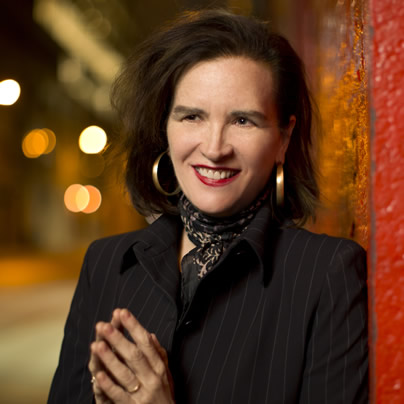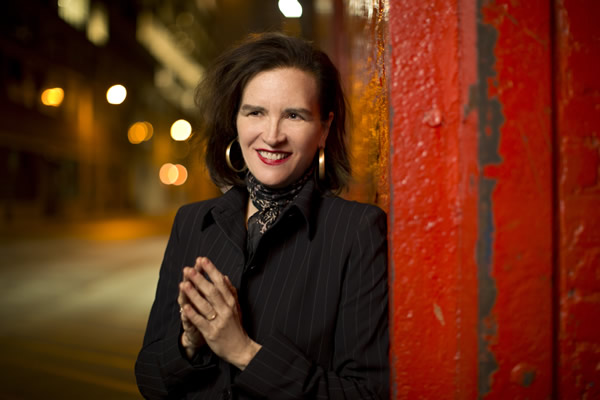Arts & Entertainment
Cerebral jazz
Patricia Barber brings her smart, able combo to D.C. this weekend


Patricia Barber wondered early on if coming out would affect her career. She says in the jazz clubs of her native Chicago, it was a non-issue. (Photo by Jimmy Katz)
Patricia Barber Trio
Blues Alley
1073 Wisconsin Ave., N.W.
Friday 8 and 10 p.m.
Saturday 8 and 10 p.m.
Sunday 8 and 10 p.m.
$27.50
patriciabarber.com
bluesalley.com
Jazz iconoclast Patricia Barber has a six-show run at Blues Alley slated for this weekend. She’s touring behind her newest album “Smash” (Concord), which was released in January. We spoke with the 57-year-old Chicago resident (and native) by phone last week from her summer home in Michigan. Her comments have been slightly edited for length.
WASHINGTON BLADE: The iPad seems to be increasingly replacing printed scores and lead sheets and I know you use one when you perform. Have you ever had it freeze up or die on you when you’re playing?
PATRICIA BARBER: No, it never has. I always carry a back-up flash drive with all my sheet music on it so at any hotel I could print out anything I needed, but I’ve never had any problem. It saves me a lot of weight. I don’t have to carry all those charts around.
BLADE: Jazz is, of course, more improvisatory than pop. To what degree do you think through your vocal inflections or piano variations before you go on stage versus what happens in the moment?
BARBER: I’ve never given any thought to that. It’s just part of improv. I never give any thought to trying to make it sound like the record. That’s for pop musicians to do. I just have a good sense of harmony and good technique. I practice a lot.
BLADE: Do you spend a lot of time in Michigan?
BARBER: Well, a lot in the summer. I stopped touring in the summer quite a few years ago. It’s just too hot and crowded. I have a big organic garden here. So we feed people, swim in the lake. It’s just wonderful. (Partner) Martha (Feldman) is an academic so she has summers off.
BLADE: Do you hate to leave for your upcoming dates?
BARBER: I get nostalgic but not right now. I’m feeling pretty good. Things have slowed down so it’s not the usual sense of dread I usually feel this time of year.
BLADE: Do you tour with your own piano?
BARBER: No. Most jazz musicians don’t unless it’s some kind of electronic.
BLADE: How do you ensure the quality is going to be where you need it to be?
BARBER: It’s all in the contracts. It’s all very finicky, that it has to be a certain quality type and tuning.
BLADE: How many of the players who travel with you played on “Smash”?
BARBER: Two out of the four. We’re sort of mixing it up. It doesn’t mean they weren’t good.
BLADE: Obviously you love music but I also sense some ambivalence about your musical career in other interviews you’ve given. Is that fair to say? You seem to have a love-hate relationship with the whole thing.
BARBER: My recording career, no. That’s fun and easy. Touring is very difficult so yeah, I think you hit it right on the head. Well, let me re-phrase that. Certainly not this sweet little tour to D.C. or a 10-day tour to Europe. But I’m pretty much done with the grueling 12-hour spans getting to a city.
BLADE: Now that “Smash” has been out for a while and had time to gestate, how do you feel about it? Is it hard to assess how well something worked when you’re still close to it? Has it been hard to find a way for it to live in a live setting?
BARBER: I still love it. I don’t know that my feelings have changed at all. I’m still finding ways to transpose, as you put it, to the stage. With jazz, you can’t stick to one performance so I’m purposefully trying not to sound like the recording. It’s interesting what you can do with a quartet vs. a trio. It’s slightly different each time. But I’m still in love with it.
BLADE: Is “Devil’s Food” a political statement?
BARBER: It’s my first gay song … It’s definitely coming from the DOMA political situation. That whole court case was coming up and my feelings about it. It isn’t obviously gay until you’re listening to it. It’s fun to watch people’s faces because it turns into a disco song. Jazz is usually very serious but this is just gay fun.
BLADE: Do you feel the press has focused too much on your sexual orientation throughout your career?
BARBER: Yes. It’s the first thing on Wikipedia. I’m a lesbian jazz musician. To me, that’s not a category but OK. I’m hoping as we’ve all grown older that being gay continues becoming just part of the normal fabric of everything and people will focus on the music more but you have to remember years ago, we weren’t anywhere close to where we are now on that.
BLADE: You were out pretty early on though. Were you just pretty much organically out or was it a conscious decision at some point to be out?
BARBER: I had a whole issue with that. I was working at a pretty famous club in Chicago that was very popular. We had lines around the block and I worked there six nights a week with a trio. And yeah, at the beginning — this was many, many years ago — I wondered if they would have hired me if I’d been out. It was such a hetero scene there so I definitely worried about it but then I came out to my boss and … he thought it was sexy and kind of cool in a sort of perverted way. But it hasn’t ended up affecting my audience at all. They’ve always been mixed — straight, gay, black, white, young, old.
BLADE: You’re playing six shows in D.C. Is it designed to be something people can see over a few nights or is it pretty much the same show?
BARBER: I don’t expect that people would see it twice. That would be unusual. It will pretty much be the same set.
BLADE: Do jazz fans bring expectations with them the way people expect pop acts to always do certain hits?
BARBER: I think they want to hear stuff from “Smash” and they sometimes have old favorites they want to hear. Sometimes they send me notes. If it’s easy to do, sure, I’ll do it. I have a huge repertoire by now. I’m happy to try it if I can or if I just want to sit and play “Autumn Leaves” for an hour and a half, I’ll do that.
Out & About
The Rare Book Fair is coming to D.C.
Over 35 antiquarian booksellers from across the country to attend

The Capital Rare Book Fair will bring more than 35 antiquarian booksellers from across the country to D.C. from Friday, May 3 to Sunday, May 5 at the historic University Club at 1135 16th St., N.W.
This year, the fair will take over two floors in the illustrious mansion on 16th Street and showcase thousands of beautiful, notable, and rare books, maps, and historic documents from around the globe. Exceptional examples that will be offered include leaf 27 of a 40-leaf xylographic Biblia pauperum, a picture Bible from 1465 for $85,000 from Bruce McKittrick Rare Books, among many other intriguing selections.
Tickets are $50 and more information is available on the event’s website.

Friday, April 19
Center Aging Friday Tea Time will be at 2 p.m. on Zoom. This is a social hour for older LGBTQ adults. Guests are encouraged to bring a beverage of choice. For more information, email [email protected].
Go Gay DC will host “Drag Pageant” at 8 p.m. at Freddie’s Beach Bar and Restaurant. Net proceeds from this event will benefit EQUALITY NoVa, the local nonprofit organization dedicated to advancing equality in Northern Virginia. Attendance is free and more details are available on Eventbrite.
Saturday, April 20
LGBTQ People of Color Support Group will be at 1 p.m. on Zoom. This peer support group is an outlet for LGBTQ People of Color to come together and talk about anything affecting them in a space that strives to be safe and judgment free. For more details, visit thedccenter.org/poc or facebook.com/centerpoc.
Go Gay DC will host “LGBTQ+ Brunch” at 11 a.m. at Freddie’s Beach Bar & Restaurant. This fun weekly event brings the DMV area LGBTQ community, including allies, together for delicious food and conversation. Attendance is free and more details are available on Eventbrite.
Sunday, April 21
Go Gay DC will host “LGBTQ+ Dinner” at 7 p.m. at Federico Ristorante Italiano. Attendance is free and more details are available on Eventbrite.
AfroCode DC will be at 4 p.m. at Decades DC. This event will be an experience of non-stop music, dancing, and good vibes and a crossover of genres and a fusion of cultures. Tickets cost $40 and can be purchased on Eventbrite.
Monday, April 22
Center Aging: Monday Coffee & Conversation will be at 10 a.m. on Zoom. This is a social hour for older LGBTQ adults. Guests are encouraged to bring a beverage of their choice. For more details, email [email protected].
Tuesday, April 23
Pride on the Patio Events will host “LGBTQ Social Mixer” at 5:30 p.m. at Showroom. Dress is casual, fancy, or comfortable. Guests are encouraged to bring their most authentic self to chat, laugh, and get a little crazy. Admission is free and more details are on Eventbrite.
Genderqueer DC will be at 7 p.m. on Zoom. This is a support group for people who identify outside of the gender binary. Whether you’re bigender, agender, genderfluid, or just know that you’re not 100% cis. For more details, visit genderqueerdc.org or Facebook.
Wednesday, April 24
Job Club will be at 6 p.m. on Zoom. This is a weekly job support program to help job entrants and seekers, including the long-term unemployed, improve self-confidence, motivation, resilience and productivity for effective job searches and networking — allowing participants to move away from being merely “applicants” toward being “candidates.” For more information, email [email protected] or visit [email protected].
Asexual and Aromantic Group will be at 7 p.m. on Zoom. This is a space where people who are questioning this aspect of their identity or those who identify as asexual and/or aromantic can come together, share stories and experiences, and discuss various topics. For more details, email [email protected].
Thursday, April 25
The DC Center’s Fresh Produce Program will be held all day at the DC Center for the LGBT Community. People will be informed on Wednesday at 5:00 pm if they are picked to receive a produce box. No proof of residency or income is required. For more information, email [email protected] or call 202-682-2245.
Virtual Yoga with Charles M. will be at 7 p.m. on Zoom. This is a free weekly class focusing on yoga, breath work, and meditation. For more details, visit the DC Center for the LGBT Community’s website.
Movies
After 25 years, a forgotten queer classic reemerges in 4K glory
Screwball rom-com ‘I Think I Do’ finds new appreciation

In 2024, with queer-themed entertainment available on demand via any number of streaming services, it’s sometimes easy to forget that such content was once very hard to find.
It wasn’t all that long ago, really. Even in the post-Stonewall ‘70s and ‘80s, movies or shows – especially those in the mainstream – that dared to feature queer characters, much less tell their stories, were branded from the outset as “controversial.” It has been a difficult, winding road to bring on-screen queer storytelling into the light of day – despite the outrage and protest from bigots that, depressingly, still continues to rear its ugly head against any effort to normalize queer existence in the wider culture.
There’s still a long way to go, of course, but it’s important to acknowledge how far we’ve come – and to recognize the efforts of those who have fought against the tide to pave the way. After all, progress doesn’t happen in a vacuum, and if not for the queer artists who have hustled to bring their projects to fruition over the years, we would still be getting queer-coded characters as comedy relief or tragic victims from an industry bent on protecting its bottom line by playing to the middle, instead of the (mostly) authentic queer-friendly narratives that grace our screens today.
The list of such queer storytellers includes names that have become familiar over the years, pioneers of the “Queer New Wave” of the ‘90s like Todd Haynes, Gus Van Sant, Gregg Araki, or Bruce LaBruce, whose work at various levels of the indie and “underground” queer cinema movement attracted enough attention – and, inevitably, notoriety – to make them known, at least by reputation, to most audiences within the community today.
But for every “Poison” or “The Living End” or “Hustler White,” there are dozens of other not-so-well-remembered queer films from the era; mostly screened at LGBTQ film festivals like LA’s Outfest or San Francisco’s Frameline, they might have experienced a flurry of interest and the occasional accolade, or even a brief commercial release on a handful of screens, before slipping away into fading memory. In the days before streaming, the options were limited for such titles; home video distribution was a costly proposition, especially when there was no guarantee of a built-in audience, so most of them disappeared into a kind of cinematic limbo – from which, thankfully, they are beginning to be rediscovered.
Consider, for instance, “I Think I Do,” the 1998 screwball romantic comedy by writer/director Brian Sloan that was screened last week – in a newly restored 4K print undertaken by Strand Releasing – in Brooklyn as the Closing Night Selection of NewFest’s “Queering the Canon” series. It’s a film that features the late trans actor and activist Alexis Arquette in a starring, pre-transition role, as well as now-mature gay heartthrob Tuc Watkins and out queer actor Guillermo Diaz in supporting turns, but for over two decades has been considered as little more than a footnote in the filmographies of these and the other performers in its ensemble cast. It deserves to be seen as much more than that, and thanks to a resurgence of interest in the queer cinema renaissance from younger film buffs in the community, it’s finally getting that chance.
Set among a circle of friends and classmates at Washington, D.C.’s George Washington University, it’s a comedic – yet heartfelt and nuanced – story of love left unrequited and unresolved between two roommates, openly gay Bob (Arquette) and seemingly straight Brendan (Christian Maelen), whose relationship in college comes to an ugly and humiliating end at a Valentine’s Day party before graduation. A few years later, the gang is reunited for the wedding of Carol (Luna Lauren Vélez) and Matt (Jamie Harrold), who have been a couple since the old days. Bob, now a TV writer engaged to a handsome soap opera star (Watkins), is the “maid” of honor, while old gal pals Beth (Maddie Corman) and Sarah (Marianne Hagan), show up to fill out the bridal party and pursue their own romantic interests. When another old friend, Eric (Diaz), shows up with Brendan unexpectedly in tow, it sparks a behind-the-scenes scenario for the events of the wedding, in which Bob is once again thrust into his old crush’s orbit and confronted with lingering feelings that might put his current romance into question – especially since the years between appear to have led Brendan to a new understanding about his own sexuality.
In many ways, it’s a film with the unmistakable stamp of its time and provenance, a low-budget affair shot at least partly under borderline “guerilla filmmaking” conditions and marked by a certain “collegiate” sensibility that results in more than a few instances of aggressively clever dialogue and a storytelling agenda that is perhaps a bit too heavily packed. Yet at the same time, these rough edges give it a raw, DIY quality that not only makes any perceived sloppiness forgivable, but provides a kind of “outsider” vibe that it wears like a badge of honor. Add to this a collection of likable performances – including Arquette, in a winning turn that gets us easily invested in the story, and Maelen, whose DeNiro-ish looks and barely concealed sensitivity make him swoon-worthy while cementing the palpable chemistry between them – and Sloan’s 25-year-old blend of classic Hollywood rom-com and raunchy ‘90s sex farce reveals itself to be a charming, wiser-than-expected piece of entertainment, with an admirable amount of compassion and empathy for even its most stereotypical characters – like Watkins’ soap star, a walking trope of vainglorious celebrity made more fully human than appearances would suggest by the actor’s honest, emotionally intelligent performance – that leaves no doubt its heart is in the right place.
Sloan, remarking about it today, confirms that his intention was always to make a movie that was more than just frothy fluff. “While the film seems like a glossy rom-com, I always intended an underlying message about the gay couple being seen as equals to the straight couple getting married,” he says. “ And the movie is also set in Washington to underline the point.”
He also feels a sense of gratitude for what he calls an “increased interest from millennials and Gen Z in these [classic queer indie] films, many of which they are surprised to hear about from that time, especially the comedies.” Indeed, it was a pair of screenings with Queer Cinema Archive that “garnered a lot of interest from their followers,” and “helped to convince my distributor to bring the film back” after being unavailable for almost 10 years.
Mostly, however, he says “I feel very lucky that I got to make this film at that time and be a part of that movement, which signaled a sea change in the way LGBTQ characters were portrayed on screen.”
Now, thanks to Strand’s new 4K restoration, which will be available for VOD streaming on Amazon and Apple starting April 19, his film is about to be accessible to perhaps a larger audience than ever before.
Hopefully, it will open the door for the reappearance of other iconic-but-obscure classics of its era and help make it possible for a whole new generation to discover them.
-

 District of Columbia2 days ago
District of Columbia2 days agoReenactment of first gay rights picket at White House draws interest of tourists
-

 District of Columbia2 days ago
District of Columbia2 days agoNew D.C. LGBTQ+ bar Crush set to open April 19
-

 Arizona2 days ago
Arizona2 days agoAriz. governor vetoes anti-transgender, Ten Commandments bill
-

 Africa4 days ago
Africa4 days agoUgandan activists appeal ruling that upheld Anti-Homosexuality Act








